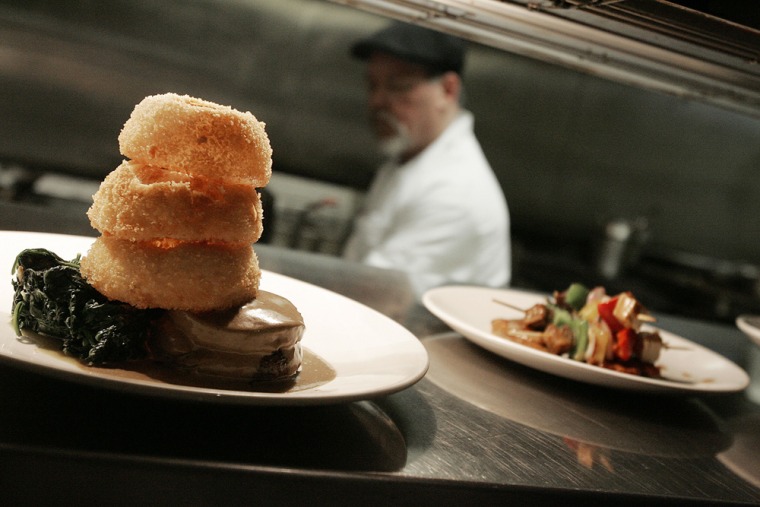The fake meat at this upscale vegan eatery doesn’t taste like mystery meat. Depending on the night it’s more like hearty meat loaf with a mushroom sauce, pork tenderloin or Mediterranean grilled chicken skewers.
At Sublime, cascading waterfalls trickle from 10-foot windows in a low-lit dining room filled with live palm trees and customers sampling $19 caviar — made of seaweed, not fish eggs.
Once a network of grungy, obscure cafes, the vegetarian and vegan experience in some cities has blossomed on par with its carnivorous counterparts, complete with Zagat ratings and celebrity clienteles.
There are between 1,000 and 1,200 vegetarian restaurants in the U.S., almost double the number seven years ago, according to Dennis Bayomi, president of VegDining.com, an online guide to vegetarian restaurants. Besides Sublime, he estimates there are more than a dozen fine dining vegan eateries nationwide, though that number is harder to track.
Part of the transformation owes to advances in cooking that allow chefs to prepare proteins like tofu with a taste and texture similar to meat. They can do the same thing with tempeh, which consists of fermented soybeans with a more grainy texture, and seitan, a concentrated wheat gluten.
Experts also credit the rise to an expanding global pantry, where vegetarian dishes are no longer relegated to the back of a menu, but have become main-plate specials.
“The door is wide open,” said Eve Felder, associate dean for culinary arts at the Culinary Institute of America in Hyde Park, N.Y. “It’s been going on in pockets for years, but it’s much more of a trend across restaurants now.”
New York-based Candle 79 has carved a profitable niche among vegetable-loving foodies with New York Times reviews, a popular cookbook and takeout items sold at Whole Foods Market. Paul McCartney, Alicia Silverstone and Woody Harrelson are all regulars, said owner Bart Potenza. One zealot flew two Candle chefs to Arizona recently just to cater his birthday bash.
“We’ve taken it to a whole other level. It couldn’t have happened 5 or 10 years ago,” Potenza said.
They’ve sold 3 million vegan meals in the last 20 years and do about $3 million in annual business, serving up seitan picatta with lemon caper sauce and ancho-seared tempeh with roasted sweet potato purée and pomegranate reduction.
No matter how sumptuous the stir fry, Potenza admits vegan restaurants can have more trouble becoming cash cows.
“They say it’s harder to change people’s food habits than their religion or politics,” he said.
It’s also more expensive. While the “meat” may be cheaper, Potenza says it costs 40 percent more to serve organic products.
Sublime owner Nanci Alexander has never turned a profit since opening in 2003 and doesn’t receive a paycheck. The animal rights activist has no experience in the restaurant business, and says she only opened Sublime to help carnivores stop eating meat. All proceeds, if there are any, would go to the Animal Rights Foundation of Florida.
“They can’t stop if they don’t have someplace to go,” she said. “I thought, ’How else can I help the animals?’ I never wanted to be in the restaurant business.”
Celebrities like Pamela Anderson, Bob Barker and Alec Baldwin are fans of the fare and philosophy.
Kathy Bernhard and Garrett Norman, both 24, recently drove four hours from Tampa recently just to eat there.
“Most every single place we go to isn’t 100 percent vegetarian and if it is, it’s not usually a nice atmosphere,” Norman said. “So we decided to make a weekend of it and we’ll come back tomorrow and try something different.”
Chef Rich Landau and his wife Kate Jacoby opened Horizons in the Philadelphia suburbs 11 years ago with low-key plans. He expected to be serving coffee and hummus to college kids, and was surprised when his restaurant filled with suits and ties.
Now they’ve moved downtown, where diners wait an hour for a table on the weekends to sample pan-seared tofu with hearts of palm, poblano cream and agave baked beans, wasabi-glazed tempeh or a maitake and smoked eggplant empanada.
“I wanted to open up the doors to the mainstream public and give them foods they could relate to,” Landau said.
